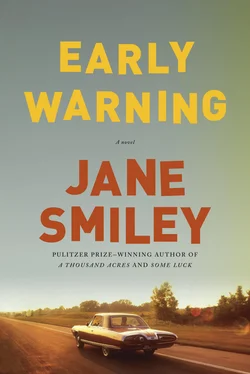Jane Smiley - Early Warning
Здесь есть возможность читать онлайн «Jane Smiley - Early Warning» весь текст электронной книги совершенно бесплатно (целиком полную версию без сокращений). В некоторых случаях можно слушать аудио, скачать через торрент в формате fb2 и присутствует краткое содержание. Год выпуска: 2015, Издательство: Knopf, Жанр: Современная проза, на английском языке. Описание произведения, (предисловие) а так же отзывы посетителей доступны на портале библиотеки ЛибКат.
- Название:Early Warning
- Автор:
- Издательство:Knopf
- Жанр:
- Год:2015
- ISBN:нет данных
- Рейтинг книги:5 / 5. Голосов: 1
-
Избранное:Добавить в избранное
- Отзывы:
-
Ваша оценка:
- 100
- 1
- 2
- 3
- 4
- 5
Early Warning: краткое содержание, описание и аннотация
Предлагаем к чтению аннотацию, описание, краткое содержание или предисловие (зависит от того, что написал сам автор книги «Early Warning»). Если вы не нашли необходимую информацию о книге — напишите в комментариях, мы постараемся отыскать её.
, a national best seller published to rave reviews from coast to coast.
Early Warning — читать онлайн бесплатно полную книгу (весь текст) целиком
Ниже представлен текст книги, разбитый по страницам. Система сохранения места последней прочитанной страницы, позволяет с удобством читать онлайн бесплатно книгу «Early Warning», без необходимости каждый раз заново искать на чём Вы остановились. Поставьте закладку, и сможете в любой момент перейти на страницу, на которой закончили чтение.
Интервал:
Закладка:
Janet turned away from the phone and repeated this. The voice in the background laughed, and then Janet laughed. Andy let out the breath she was holding. Janet turned back to the phone and said, “Oh, I love you, Mom.”
She hadn’t said that in twenty years. But as if this declaration were routine, Andy said, “Sweetie. I have to get off. But call me tomorrow and tell me more.”
Janet said she would.
When she walked into the kitchen half an hour later, Frank was leaning into the open refrigerator. She said, “There’s some ravioli from Antonio’s in that cardboard box. It was good.”
Frank stood up and turned around. Before he could tell her anything at all about work, she said, “Janet is pregnant.”
Frank slammed the door of the refrigerator and said, “I didn’t know there was a boyfriend.”
“Neither did I.”
“Are they getting married?”
“I guess we’ll find out.”
Frank swallowed, and then swallowed again. Eloise’s report had frightened him, too, though he had said only, “Doesn’t surprise me.” Andy walked over to him, put her arms around him, and laid her head on his chest. She could hear his heart beating — loud booms. She’d always wondered how his arteries could take such a powerful current. He remained stiff for a few moments, and then he yielded, put his arms around her. This was the way, so long ago, forty years now, she had first come to love him. You had to get inside his shell to feel sorry for him; if you didn’t feel sorry for him, then you couldn’t experience love, but if you pressed yourself against him and felt the warm tension of his flesh, you always felt sorry for him, and tender, too, as lonely as he was. He might hate that, but if you were brave, you would feel it anyway. She felt it now.
—
PAUL HAD INVESTED “their” money from the farm in something called a Money Market Fund, at almost 9 percent, first for six months, then for another six months. He had longed for the money and been happy to get it, but he was preoccupied by it — he made sure that Gray and Brad, thirteen and ten, knew the difference between a Certificate of Deposit and a Treasury Bill, but Claire did not know the difference, and didn’t care. All she knew was that her original $240,000 was bubbling up, and the effervescence amounted to about twenty thousand a year. Paul insisted that the wisest thing to do was to let the interest compound, and he taught the boys the Rule of Seventy-two. Even Brad now knew that if you left your money in the bank at 10 percent interest per year, and then divided seventy-two by ten, the resulting figure was how long it would take for your money to double. If you had, say, $240,000, he said to Brad, by the time you were eighteen you would have $480,000, and by the time you were twenty-four or twenty-five, you would have almost a million, but you couldn’t touch it. It had to stay in the bank. The great thing was geometric compounding — at thirty, you would have two million; at thirty-seven, four million; etc. Brad could figure it out from there. And Brad did — if retirement age was sixty-five, then at retirement you would have more than sixty-four million dollars!
When Claire brought up the idea of inflation (that sixty-four million dollars wouldn’t be the same in fifty-some years as it was today, look at Germany before the war, or…), Paul said that they would save that for another time — best not to discourage him at this point.
As for Claire, for the first time in her life, she understood the old phrase “eat, drink, and be merry, for tomorrow we shall die.” She thought of that measly little $240,000 (as compared with the future sixty-four million) and she wanted some of it. In fact, she wanted all of it. In fact, she saw it as the door that could open and let her out of Paul’s tight, neat, suffocating house. Now that her mother was dead, she had no one she would have to justify this to. All she had to do was make up her mind.
It was not the boys holding her back. Maybe if they had been girls she would have had a second thought (she imagined girls actually talking to her, letting her brush their hair, asking her questions, and taking advice, though she had never done any of these things with Rosanna), but boys, at least her boys, hardly seemed to notice their mothers. At a party, she had heard one woman laugh and say, “Oh, boys! You can be wonderful to them every day of their lives, and this is what they say: ‘Mom! I love Mom,’ and that’s all. They only think about Dad, no matter whether he was a saint or an asshole—‘My mom was great, but Dad ! Blah, blah, blah, blah, blah.’ ” And it was true of Gray and Brad: their eyes followed Paul wherever he was. Yes, it was partly in fear, since he was demanding, but all three of them treated her more or less as if she weren’t really there, or, she might say, weren’t importantly there.
—
JANET OPENED her eyes and noticed two things — the window to her right, across the sleeping (and snoring) body of Jared, was pale but not light, and the apartment was enveloped in silence. Emily Inez (named after Emily Brontë and Jared’s mother) was still sleeping, and well she should be, given that Janet had nursed her twice already, once at ten and again at three. Since the apartment had only one bedroom, Jared had taken the doors off the spacious hall closet and fixed it up as a nursery, visible from the kitchen, the bedroom, and the living room, but Janet knew they would have to move eventually. Janet didn’t mind waking up every four hours. Emily had such a strong personality that she had inserted herself quite efficiently into Janet and Jared’s easygoing existence, and organized everything around herself. Janet faithfully read Penelope Leach (sent to her by Debbie), and did as Emily told her.
She glanced at the clock: six-forty-five. The weather had been nice all fall, and she could tell as the window brightened that it would be another pleasant day; she could put Emily in the Snugli and walk across Burlington, take a stroll down Clinton and Dubuque, and maybe get all the way to the Hamburg Inn for an early lunch — Emily was sucking the pounds off Janet so quickly that she owed herself a cheeseburger, not to mention some French toast for breakfast. She kissed Jared on his bare shoulder (he wore only shorts to bed, nicely exposing his muscular but supple thirty-year-old chest, and wasn’t thirty the best age for a husband, especially if you yourself were twenty-eight? And he was a Gemini to her Libra, nothing better than that), eased out of bed, sneaked past Emily, who was sleeping with her mouth slightly open and her lips, which were divinely full, shaped into a sort of a kiss. She half closed the kitchen door and hefted the kettle — full. She turned on the gas, yawned, and decided that it was perfectly acceptable to go quietly down the hall steps in her pajamas, and even to open the front door and get the paper off the stoop. She set a cup and the instant coffee on the counter, and tiptoed once again past the sleeping baby, and then past the door to her room, and down. Six weeks after delivery, going down the steps was practically like flying compared with the last six weeks of her pregnancy, when the pains in her lower belly made her gasp. Tendons? Ligaments? Something in there was screaming in protest at carrying a thirty-five-pound load that it was not designed to handle. She glanced at the Harrisons’ closed door, then slowly turned the knob of the front entrance. The paper was lying there. She grabbed it, noticing as well the bare branches and the drift of brown leaves in the gutters — a melancholy sight. She clutched The Des Moines Register (they also got the Press-Citizen in the afternoon) and tiptoed back up in time for the first cry.
Penelope Leach said that you should answer the first cry — babies only cry for a reason, and to ignore them is to impress upon them the futility of communication — so she threw the paper onto the kitchen table and went to the cradle. After she picked up Emily, she eased over to the bedroom door and drew it shut, letting Jared know that he could keep sleeping if he wanted to. He didn’t have to be at work at the U of I computer lab until noon; Mondays, he was on until eight-thirty, advising lost and confused professors how to stack their punch cards and input data. It was a well-paid job, and Jared liked it — he said that every iota of computer competence he introduced into the brains of old men and women was a positive social good, a point in his favor in the mind of the Grand Intelligence that was the universe. Janet had quit her job at Things, Things, and Things when the steps in the shop got too taxing, but they were doing well enough on Jared’s salary. She would go back to school in the spring semester, at least at night. Debbie said that teaching fit right into having kids, even two kids, which she now had, so Janet thought she would do that: have two kids, live wherever Jared worked, teach French in high school. This made her think of Marla, who had written from Paris in the summer. She sat down at the kitchen table and, after putting Emily to the breast, flipped open the paper.
Читать дальшеИнтервал:
Закладка:
Похожие книги на «Early Warning»
Представляем Вашему вниманию похожие книги на «Early Warning» списком для выбора. Мы отобрали схожую по названию и смыслу литературу в надежде предоставить читателям больше вариантов отыскать новые, интересные, ещё непрочитанные произведения.
Обсуждение, отзывы о книге «Early Warning» и просто собственные мнения читателей. Оставьте ваши комментарии, напишите, что Вы думаете о произведении, его смысле или главных героях. Укажите что конкретно понравилось, а что нет, и почему Вы так считаете.











